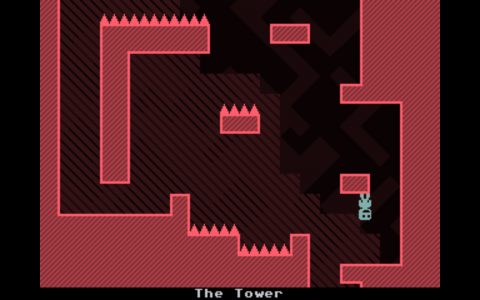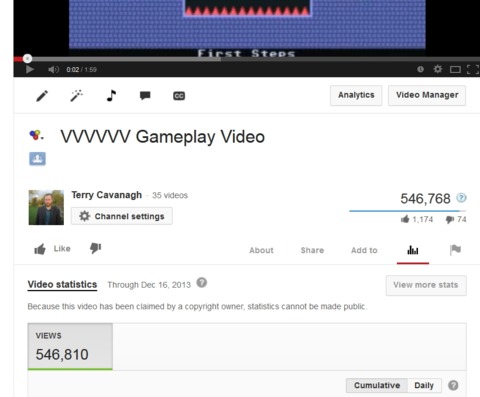Terry Cavanagh is the designer of VVVVVV. He published a gameplay video of VVVVVV on his YouTube channel, and it was flagged with a copyright claim. Magnus Pålsson is the composer of VVVVVV’s music. He also started getting copyright notices about his own music on YouTube.

This is the height of absurdity, and underlines the crossroads YouTube faces when it comes to finding the line on a website built on monetizing user generated content and protecting copyright holders. Right now, it’s very clear which side YouTube is favoring.
The basic question facing YouTube right now is fair use. Fair use is what allows an individual or group to use copyrighted material in their own work. According to the US Copyright Office, that includes “criticism, comment, news reporting, teaching, scholarship, and research.” With games, we’re often talking about people playing games, recording themselves playing them, and putting those videos up on YouTube. Sometimes with commentary, sometimes without. But at its very base level, it’s the recording of playing a game.
On YouTube, these creators are on the defensive.
YouTube faces a dilemma. When Viacom sued YouTube back in 2007 for more than a billion dollars, it prompted the company to start down a road it has continued on ever since. Copyright holders hold immense power on YouTube, and YouTube bends to their will. If a copyright holder makes a claim, that claim is assumed true until it’s proven otherwise by the YouTube user. If a user is unable to prove it has a valid use of copyright, they earn a strike. Three strikes? Your account is gone. That means starting a new channel over from scratch.
Content ID, the system that’s caused recent headaches, is a system created by YouTube in which YouTube videos are matched against files submitted by copyright holders. If a match is found, the policy of the copyright holder is applied. There are three options: monetize (the holder can turn on ads), block (video may no longer be viewable or audio may be muted), and track (nothing changes, but stats are monitored).
The most recent changes to Content ID differentiate between “managed” and “affiliate” channels on YouTube. Managed channels have a deal with YouTube. Machinima is a good example. Most of Machinima is not impacted by these changes, and does not have to worry about Content ID. An affiliate channel is Ryan “Northernlion” Letourneau, who is now responding to individual copyright requests depriving him of revenue.
When a video is being disputed over copyright, it is no longer able to be monetized by the video creator. Every day counts. Why do you think game publications try to hit embargo times for game reviews? You're trying to capitalize on mass interest. It's traffic, and traffic is money. Missing even a day or two can be catastrophic.
Content ID’s an extension of this power for copyright holders, but it’s come with unintended consequences. One includes Let’s Play and other videos being flagged because those games, uh, have music. Soundtrack distribution and artist representation is often handled by companies other than the game publisher.
A closer look at the VVVVVV situation will illuminate what I mean by this.
Pålsson posts on Twitter about how he’s getting copyright noticed about his own material. How?
I'm getting copyright infringement notifications on my own music on youtube.
— Magnus Pålsson (@MPSouleye) December 17, 2013
TuneCore is a service that helps artists sell their music on a variety of online shops, including iTunes, Amazon, Spotify, and most recently, YouTube. According to TuneCore’s website, TuneCore partners with INDMUSIC, an independent music network on YouTube.
“You're owed money every time people use your music in their YouTube videos,” reads TuneCore’s website. “We'll help you collect the most money from YouTube when you use TuneCore for publishing and distribution.”
In this deal, artists keep 90% of royalties from their compositions, 80% of royalties from music used in other people’s YouTube videos, and 100% of royalties from the artist's own YouTube channel.
That leads us to this response from TuneCore on Twitter.
@_Branislav_ @MPSouleye Claims are placed on the music for you, Magnus. All our publishing admin customers collect revenue from YouTube...
— TuneCore (@TuneCore) December 17, 2013
In this humorous exchange, TuneCore is informing Pålsson that TuneCore is actually providing a service for him. TuneCore is serving these copyright notices to folks using his music, which also includes videos of VVVVVV that feature his music. It’s easy to see how this begins to spiral in a million different directions.
Unfortunately for TuneCore, Pålsson doesn’t see this as a service.
@TuneCore @_Branislav_ Ok. Now, how to help lets-players and reviewers of the games I made music for? They're many and I don't know them.
— Magnus Pålsson (@MPSouleye) December 17, 2013
@TuneCore @_Branislav_ Done. How can I stop my employers from getting flagged? And what about letsplays of games etc? I'm a game musician!
— Magnus Pålsson (@MPSouleye) December 17, 2013
And this is where TuneCore becomes very, very confused.
@MPSouleye @_Branislav_ Please email our team at songwriters@tunecore.com with a list of who you have given permission to use your music!
— TuneCore (@TuneCore) December 17, 2013
@MPSouleye @_Branislav_ ...don't know them, how could you give them permission to use your music? It's claimed for you, since you wrote it.
— TuneCore (@TuneCore) December 18, 2013
TuneCore can’t imagine a world where Pålsson would want others to use his music freely, including making money off it, without his explicit permission every single time someone makes this decision. Yet for many, this is part of what makes YouTube powerful, a platform for people to share, create, and mix and match content. For America’s archaic copyright system, one that favors copyright holders, it leads to competing interests.
“I want to say that TuneCore isn't a villain,” said Pålsson during an email exchange last night. “I've used them for a long time and their service has been pretty dang good thus far. This problem is systematic and symptomatic of outdated copyright and licensing laws that have not adapted to today's interconnected internet lifestyle that you and I have grown accustomed to.”

Pålsson has since talked to TuneCore on the phone to express his problems. He was unaware TuneCore and INDMUSIC had rolled out an automatic identifier (this is the Content ID system) on his behalf, a notice representing Pålsson without Pålsson knowing it was happening. He had assumed this was an error, something he needed to be asked to opt in to, but that’s not the case, as it was part a publishing deal he already signed, albeit prior to TuneCore/INDMUSIC rolling into YouTube.
INDMUSIC CEO and co-founder Brandon Martinez pointed to a communication issue.
“With YouTube's new claims system, tons of channels that weren't previously subject to Content ID claims are now being hit with claims, both valid and invalid,” said Martinez. “INDMUSIC also recently partnered with TuneCore to manage their artists' rights on YouTube. Many of these artists are video game composers who have previously licensed or sold their music without communicating this to their Publisher, TuneCore. When TuneCore's content was uploaded to YouTube, no one was aware that so many channels would be affected because none of this information had been communicated.”
The solutions presented to Pålsson each have a number of drawbacks that don't sit well with him. He can create a whitelist for his content, a set of YouTube users who are allowed to monetize his compositions.
“This alternative will be quite troublesome for the guys doing letsplay videos and reviews etc,” he said. “It would also punish the developer who might not get their game reviewed because of the hassle involved with getting on whitelists.”
The next option is to opt out of the publishing part of his publishing agreement, but since there is no way to easily opt out of just YouTube, that means losing additional revenue streams.
“The publishing part is tied to more services such as Spotify and iTunes under the TuneCore umbrella,” he said. “The money lost there will end up in the hands of those distributors instead. Granted, the artist still retains most of it, but it's a significant deal to lose out a chunk of money on each sale on a bunch of distribution places when there's already middle-men around.”
Pålsson continually pointed out that he believes the problem isn’t necessarily with TuneCore, but given the current framework, it’s unclear how to develop a system that benefits everyone.
“I don't know exactly how it would work technically without generating tons of administrative work” he said. “All I know is that I would like the lets-players, reviewers and game devs use as much music they need to do their work without having a lot of red tape to go through, as it's in the musicians' best interest as well.”
What’s happening on YouTube is important because this content is valuable. YouTube users aren’t just “personalities” to be swept under the rug. Many of them are doing work as legitimate as what myself and my other "traditional" press colleagues do every day. It’s just easier to regulate what’s happening on YouTube because it’s not considered press, and there are tools to manipulate what’s happening. That's not right.
"This problem is systematic and symptomatic of outdated copyright and licensing laws that have not adapted to today's interconnected internet lifestyle that you and I have grown accustomed to."
But right now, INDMUSIC doesn’t have a problem with the way it’s currently being handled.
“Videos should be disputed so content can be allowed to properly monetize,” said Martinez. “Creators should provide as much information about why they are disputing the claim as possible. The current problem is more around a massive massive batch of files being subject to ContentID all at once. It sucks that it is hurting the gaming community so heavily at the moment, but it was a messy situation that needed to be resolved. For every legitimate video this is hurting, there are three or more videos using rights without permission and profiting from such uses.”
And as it stands, YouTube isn't changing any of its policies. A letter sent out to YouTube channel holders, obtained by Kotaku, said as much.
"Whether gaming, music or comedy is your passion, know that we love what you do," said the company. "We've worked hard to design Content ID and other tools to give everyone--from individual creators to media companies--the opportunity to make great videos and earn money. As YouTube grows, we want to make sure we're providing the right product features to ensure that everyone continues to thrive."
More clashes are inevitable, but now, nobody seems happy, not even the copyright holders this is supposed to "help."